
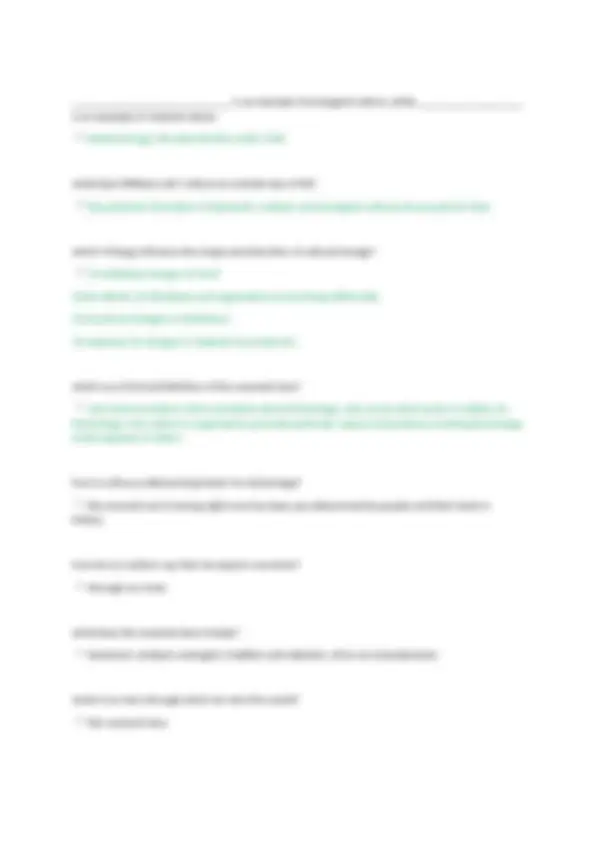
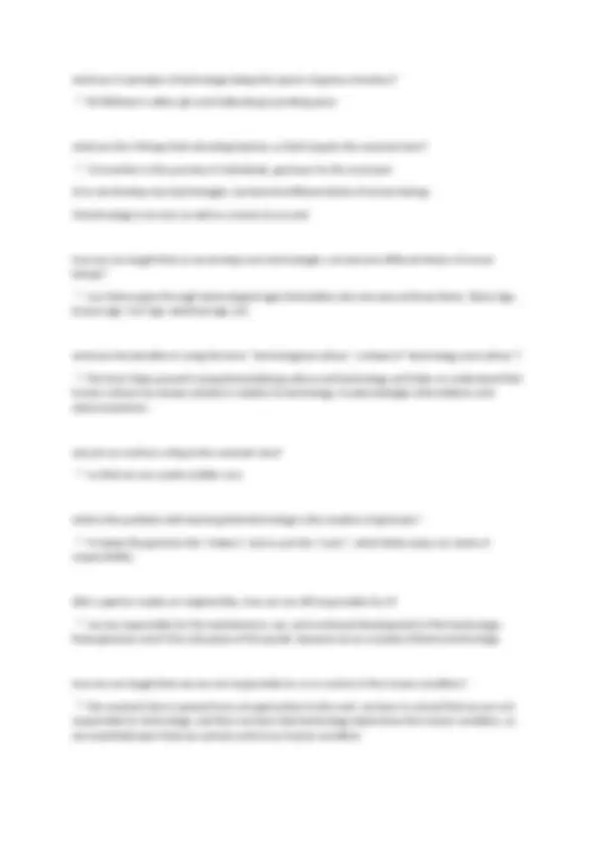
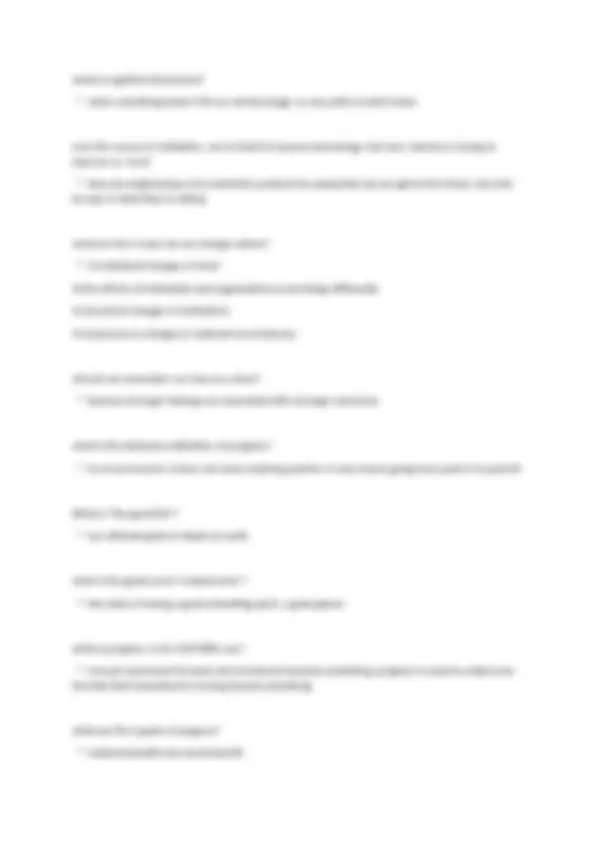
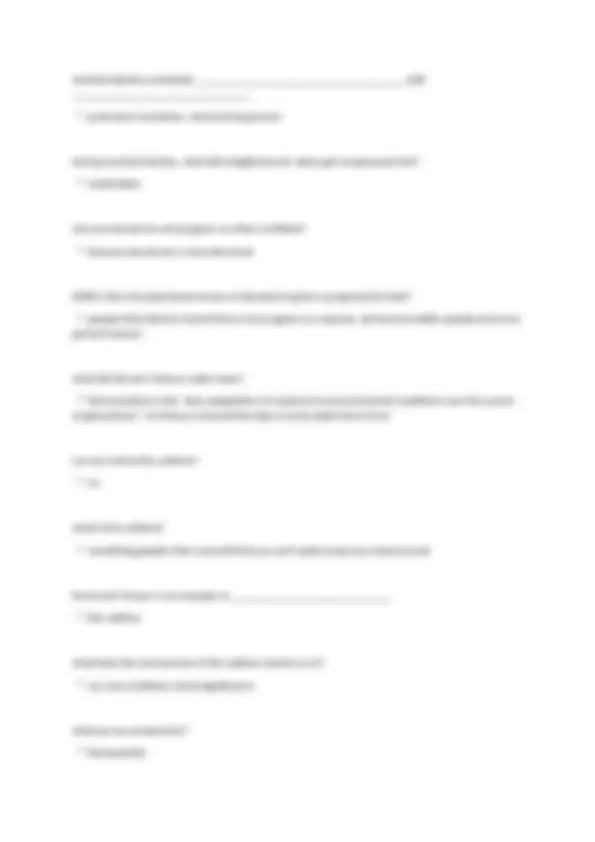
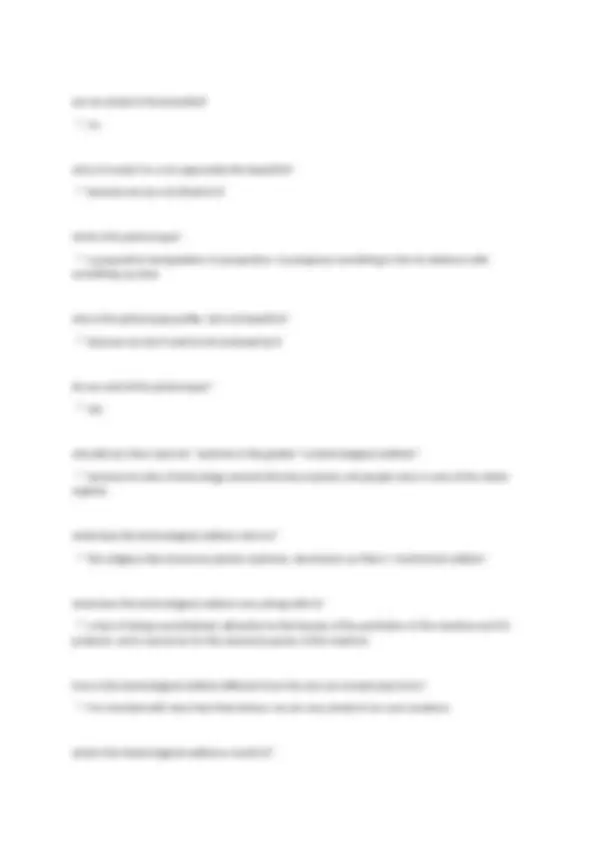
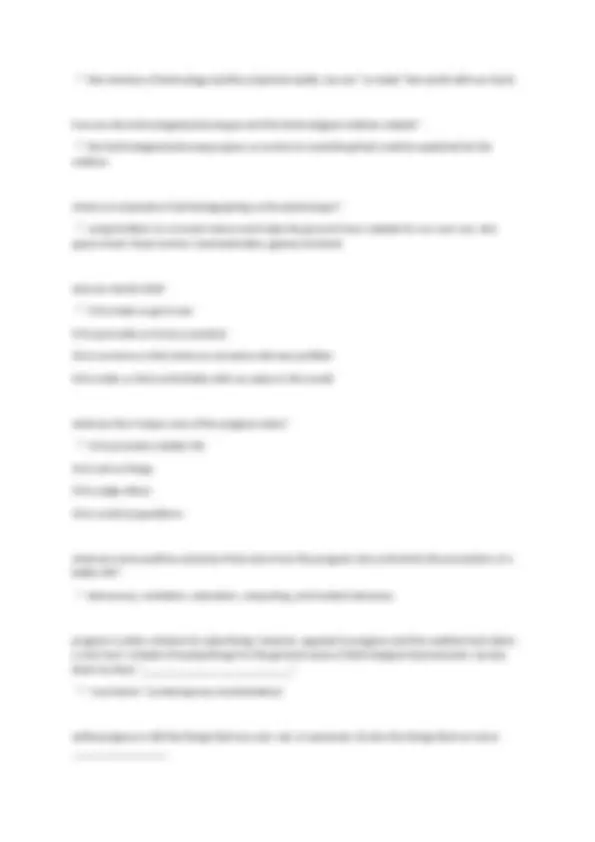
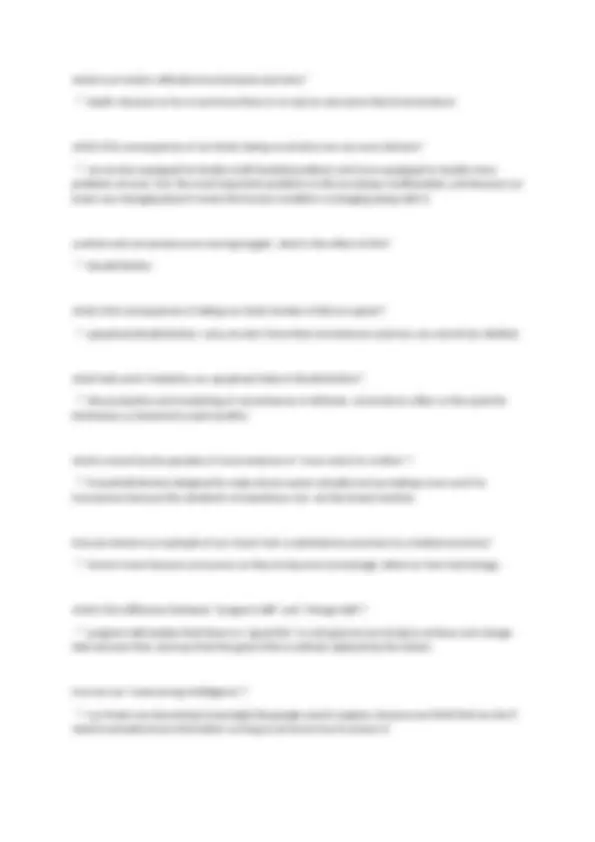
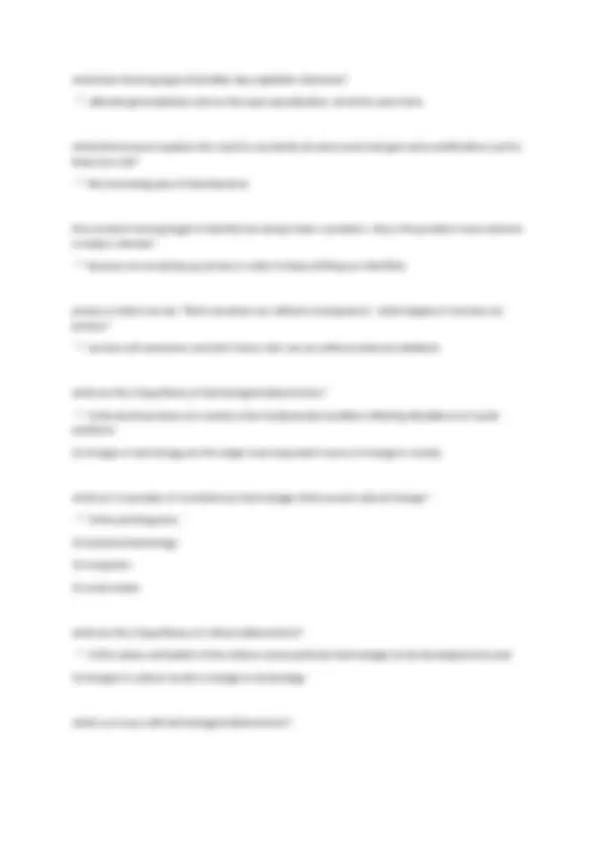
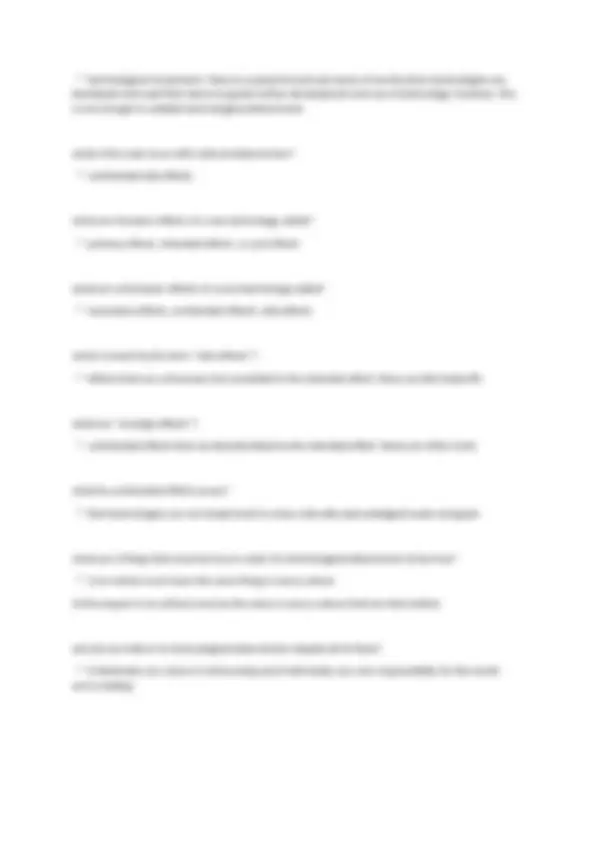


Study with the several resources on Docsity

Earn points by helping other students or get them with a premium plan


Prepare for your exams
Study with the several resources on Docsity

Earn points to download
Earn points by helping other students or get them with a premium plan
Community
Ask the community for help and clear up your study doubts
Discover the best universities in your country according to Docsity users
Free resources
Download our free guides on studying techniques, anxiety management strategies, and thesis advice from Docsity tutors
STS Final Exam Safety Trained Supervisor 133 Study Guide Questions with Correct Answers
Typology: Papers
1 / 15

This page cannot be seen from the preview
Don't miss anything!










what effect do metaphors have on the complex questions we're discussing? ** metaphors further mystify the question at hand how are world wars a combination of past fighting techniques and the future world? ** both horseback and machine guns were used does Winner advocate for a more inclusive definition of progress? ** yes who is to blame for the "outsourcing pineapples" issue? ** society what is the most likely explanation for the Dunbar number being 150, but we connect to more than 150 people on social media? ** we've sliced the 150 connections into smaller and smaller pieces, or we have people cycling in and out of our lives what are the 2 reasons philosophy of technology never got underway? ** (1) we think the only way to make progress is by inventing new machines (2) we think the human relationship w technology is too obvious to merit serious reflection who coined the term "forms of life"? ** wittgenstein who coined the term "modes of life"? ** karl marx
what are 3 technologies that created entirely new human behaviors? ** air travel, space travel, and genetic engineering what does Marx say will happen as we move toward a state of general wealth? ** Marx argues that if people spent less time on "work", they could enrich their individuality and become multidimensional what does Marx's "modes of life" prove? ** that social changes are not just an after-effect of technology how are we all "makers of the iPhone"? ** because the makers can't make them without us. we signal to the makers when we want something, and we fund the makers. is culture static or dynamic? and why? ** dynamic because it entails changing relationships between what is old and what is being reconfigured what is tradition? ** the meanings, values, artifacts, and practices that are handed down to us what is selection? ** the selecting, challenging, and arranging of these artifacts and ideas in everyday life in the interaction with changing material circumstances what is culture? ** the process whereby tradition is reconfigured in the historical conditions of everyday life. culture is both the experiences we are born into and how these are challenged or reinforced through our experiences of the world what are the 3 categorical features of culture? ** dominant, residual, and emergent
what are 2 examples of technology being the spawn of genius inventors? ** Eli Whitney's cotton gin and Guttenburg's printing press what are the 3 things that schooling teaches us that impacts the received view? ** 1) invention is the purview of individuals, geniuses for the most part
what is cognitive dissonance? ** when something doesn't fit our mental image, so we justify it until it does over the course of civilization, we've tried to improve technology, but now, industry is trying to improve us. how? ** they are engineering us to need their products by saying that we can get to the future, but only by way of what they're selling what are the 4 ways we can change culture? ** 1) individual changes of mind
** because it'll raise questions about power structures, who benefits from technology, and whether the good life is actually good for us better technology was known as _____________ while a better way of life was known as ______________. ** works and days what was a predecessor to the constitution, declaration of independence, ect? ** the pilgrim's decision to work together for the common good what was the original American dream? ** a new continent untouched by Europe's mistakes what was the 100 year war a reminder of? ** that they's built something in Europe that was flawed and failing once the pilgrims no longer thought of themselves as europeans, what happened? ** they repeated Europe in America what does Emerson suggest that we do in our efforts to make life good? ** give up having a life at all what is the machine in the garden? ** the steam railroad conquering the frontier what was manifest destiny all about? ** protestantism, curiosity, and potential for economic gain why could manifest destiny keep going without the idea of god? ** because people are inherently competitive and want to be the best
manifest destiny combined ______________________________________ with ________________________________. ** protestant worldview, westward expansion during manifest destiny, what did enlightenment values get compressed into? ** materialism why are darwinism and progress so often conflated? ** because darwinism is misunderstood HOW is the misunderstood version of darwinism given a progressivist twist? ** people think Darwin meant that as we progress as a species, we become better people and more perfect humans what did Darwin's theory really mean? ** that evolution is the "slow adaptation of creatures to environmental conditions over the course of generations". his theory removed the idea of some ideal future form can we control the sublime? ** no what is the sublime? ** something greater than yourself that you can't quite wrap your head around the Grand Canyon is an example of _____________________________. ** the sublime what does the massiveness of the sublime remind us of? ** our own smallness and insignificance what are we enslaved by? ** the beautiful
** the newness of technology and the empirical reality. we can "re make" the world with our tools how are the technological picturesque and the technological sublime related? ** the technological picturesque gives us control of something that could be explained by the sublime what is an example of technology giving us the picturesque? ** using fertilizer to re invent nature and make the ground more suitable for our own use. also space travel, flood control, manmade lakes, glasses/contacts why are stories told? ** 1) to make us go to war
** convenient what was the reason that westerners assumed Native Americans had less technology than they did? ** the westerners assumed the natives were at an earlier stage of the same linear path to progress what does the western story of progress assume? ** that progress is universal (linear) and that it is divinely inspired westerners used the progress story to label others as either "primitive" or "civilized". what were their criteria for labeling them in this way? ** the technologies they embraced the Great Exhibition in London in 1851 gave Great Britain a chance to show off __________________________________. ** the fact that they were in a time of peace, and that their colony India made fascinating products what are the results of "development projects" placed into 3rd world countries without their consent? ** it placed 3rd world countries into extreme debt and made them dependent on the western world what is bodriark's code? ** an unwritten code that everyone operates within, that takes into account everything that you are signaling. not just a ranking of brands, but consumerism's set of systematized signals why does convenience come after the progress story? ** because the progress story is more abstract what is the PRE 17th century definition of convenience? ** something was suitable to a given situation or circumstance and it was morally appropriate what is the contemporary meaning of convenience? ** something is only convenient if it is suitable to one's PERSONAL comfort or ease
what is our body's ultimate inconvenience and why? ** death, because as far as we know there is no way to overcome that inconvenience what is the consequence of our brains being re-wired as we use more devices? ** we are less equipped to handle multi-faceted problems and more equipped to handle more problems at once. but, the most important problems in life are always multifaceted. just because our brains are changing doesn't mean the human condition is changing along with it comfort and convenience are moving targets. what is the effect of this? ** dissatisfaction what is the consequence of taking our tools (modes of life) as a given? ** perpetual dissatisfaction. once we don't have that convenience anymore, we cannot be satisfied what fuels and is fueled by our perpetual state of dissatisfaction? ** the production and marketing of conveniences of all kinds. convenience offers us the quick fix that leaves us doomed to want another what is meant by the paradox of inconvenience of "more work for mother"? ** household devices designed to make chores easier actually end up making more work for housewives because the standards of cleanliness rise. ex) the bread machine how are farmers an example of our move from a substinence economy to a market economy? ** farmers have become consumers as they've become increasingly reliant on farm technology what is the difference between "progress talk" and "change talk"? ** progress talk implies that there is a "good life" or end goal we are trying to achieve, but change talk removes that, and says that the goal of life is entirely replaced by the means how are we "outsourcing intelligence"? ** our brains are becoming increasingly like google search engines, because we think that we don't need to actually know information as long as we know how to access it
what does Horning argue that latter day capitalism demands? ** ultimate generalization and on-the-spot specialization, all at the same time what phenomenon explains the need to constantly do extra work and gain extra certifications just to keep your job? ** the increasing pace of obsolescence the constant moving target of identity has always been a problem. why is the problem more extreme in today's climate? ** because we are giving up privacy in order to keep shifting our identities privacy is where we can "flesh ourselves our without consequence". what happens if we lose our privacy? ** we lose self awareness and don't know who we are without external validation what are the 2 hypothesis of technological determinism? ** 1) the technical base of a society is the fundamental condition affecting all patterns of social existence